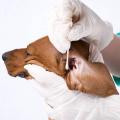Health
A healthy dog enjoys life more and usually lives longer. Even if you cannot protect your dog from all diseases, there is still a lot you can do for his well-being. In addition to good preventive care and choosing a veterinarian you trust, optimum nutrition certainly plays a big part. However, there are also other things that deserve your attention. For example, the special needs of puppies and seniors, of overweight or neutered dogs. We have collected numerous expert tips to help you find other ways of taking the best care of your dog.
-
Preventing Canine Periodontal Disease
or How to Clean My Dog’s Teeth at Home
Every year, your dog goes in to the vet clinic for her annual examination. She gets her booster shots, is checked for internal and external parasites, and, typically, has a veterinary dental cleaning to remove all the tartar and plaque from her teeth that has been building up over the previous months. Those veterinary cleanings are usually Read more -
Food Allergies in Dogs
Symptoms, Detection, and Treatment
Your dog is itching like crazy and shaking his head constantly. He’s biting at his feet and his toes, causing sores and hair loss. The scratches on his neck and ears are becoming infected, he’s obsessively rubbing his nose, and the skin on his tail and bottom is becoming rough and flaky. Your vet just told you it could be a food allergy. Read more -
Foods That Are Poisonous For Dogs
Just because your pooch begs for food from your plate or you want to get rid of some leftovers by treating your pet, that doesn’t mean that everything that is tasty for you is beneficial to your pup. Some foods humans eat can be downright dangerous for canines.
Listed below are just some of the foods and food ingredients that your dog should NEVER eat. **Note: If your dog accidentally Read more -
Canine Ear Infections
What Causes Them and How to Treat Them Naturally
An ear infection occurs when an organism outside of the body enters an animal’s outer ear causing the skin and the blood cells in the area to react with an inflammatory response. In your dog, this means that the ears become red and warm to the touch, you may notice some swelling and discharge, and you may be able to detect a Read more
4 Item(s)




